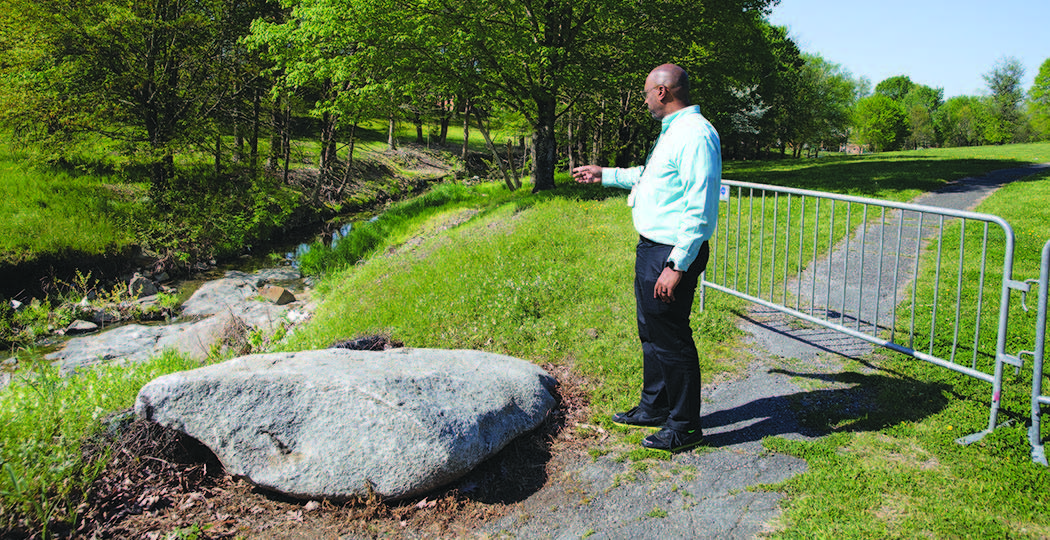Greensboro closes Bingham Park to remove contaminated soil
By Yasmine Regester, Peacemaker Staff Writer / April 18, 2024
Deputy Greensboro Parks & Recreation Director Kobe Riley points to a creek bordering Bingham Park. The park is now closed due to toxic soil contamination and will undergo a remediation process. Photo Ivan Saul Cutler/Carolina Peacemaker.
New guidelines from the U.S. Environmental Protection Agency (EPA) coupled with an updated risk management review have prompted the Greensboro Parks and Recreation Department to take additional measures to close Bingham Park.
Located on 500 Bingham St. in East Greensboro, Bingham Park is the site of a pre-regulatory landfill and household waste incinerator that operated from the 1920s through the 1950s. In the 1970s, the city converted the site into Bingham Park. It currently serves the Cottage Grove, Eastside Park, and Willow Oaks neighborhoods.
The City of Greensboro is working with the N.C. Department of Environmental Quality (DEQ) to evaluate and remediate the site. The DEQ informed Parks and Recreation of the change to the federal soil screening level for lead in soil at residential properties in April following the closure of an EPA public comment period lasting from January through March.
“They’ve been doing their investigation based on risk. Part of the process is to delineate how far and how bad the soil is,” said Richard Lovett from the Office of Sustainability and Resilience.
The city recently installed signage reflecting that park users should not wade in the stream channel, drink the water, dig in, or eat the soil. The park remained open for walking and daily use of the basketball court and baseball field; however, the basketball goals have no nets, and the pavement has shifted into jagged, split, and uneven asphalt.
On April 11, the City of Greensboro announced full closure of the park following an updated risk management review that identified hazardous levels of arsenic, iron, manganese, lead, and semi-volatile organic compounds in the soil. Broken glass, brick, metal pieces, and other types of debris were also found in the soil. Assessors also detected elevated concentrations of heavy metals, which are the result of incineration residues, such as bottom ash and fly ash.
Approximately $19 million in federal and state funding has been earmarked for remediation efforts. Through this project, all contaminated soil within the park and at the former Hampton Elementary School site will be removed and placed in a permitted municipal solid waste landfill, which can accept this type of waste.
One main concern of the residents is where that contaminated soil will go. Three landfills have been evaluated based on their proximity to Bingham Park that are able to accept the type of waste from a pre-regulatory landfill like this one.
On the list are Great Oak Landfill in Asheboro with an estimated cost of $36 million for 8-12 months of transporting 11,500 dump trucks making a 58-mile roundtrip each day; Uhwarrie Landfill in Troy for a cost of approximately $54 million for 16+ months for 11,500 dump trucks making a 120-mile round trip each day; and White Street Landfill in Greensboro (near densely populated neighborhoods) with an estimated cost of $24 to $27 million, for four months for 11,500 dump trucks making an 11-mile roundtrip each day.
With two of the landfill options owned and operated by private companies and located in different counties, the city wants to select White Street Landfill as the dump site. Based on factors such as the facility is located the closest to Bingham Park (six miles) and is owned and operated by the City of Greensboro. White Street can accept this type of project-specific waste with the revision of its solid waste permit through City Council. Use of this site reduces the overall duration of the project and thus shortens the amount of time of impact on neighboring residences. Acceptance of this waste will help close White Street fully about 8.4 years earlier than expected. Using the landfill closest to Bingham Park reduces the cost to a level that allows for a full remediation of Bingham Park.
East Greensboro residents fought hard for years to close the White Street Landfill to household waste and are concerned about the contaminated soil being dumped there.
Parks and Recreation planning staff have been engaging with the neighborhoods to develop a new Bingham Park plan for future activities and amenities. Closure signs have been placed in the park and the department is in the process of purchasing fencing to prevent access to the space.
“We’ve wanted it closed for a long time. We don’t want the risk of people getting sick from being in the park,” said Cheryl Johnson, a member of the Bingham Park Environmental Justice team.
The remediation could take two to three years to complete. The community would like to see walking trails, athletic fields, and picnic areas.
“We have also had discussions with the city, alongside the White Street neighborhood, about where the soil will go. We are still talking about what risks that soil and water has had on our community, so we want to make sure whatever is being removed is not going to harm another neighborhood, especially in another Black and Brown community,” said Johnson. “We want to make sure there is transparency about what’s going on in that park.”







